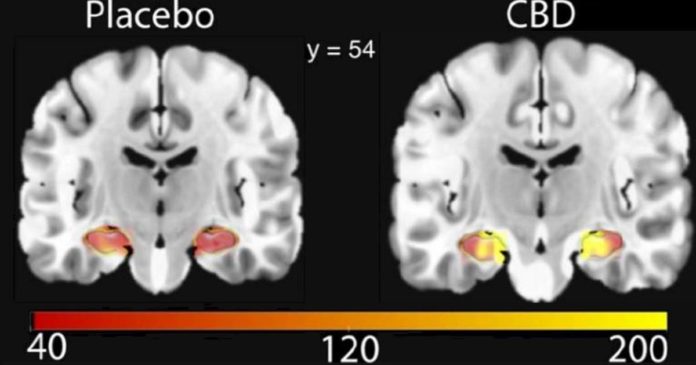University College London researchers have found a single dose of cannabidiol boosts blood flow to an important part of the brain.
The hippocampus is part of the brain’s medial temporal lobe (MTL). It plays important roles in shifting information from short-term memory to long-term memory, and in spatial memory that enables navigation. If the hippocampus is damaged, it can impact a person’s existing memories and their ability to form new memories.
The progressive shrinking of the hippocampus is responsible for the short-term memory loss that accompanies Alzheimer’s Disease, the most common form of dementia affecting up to 70% of all people with dementia.
The non-intoxicating cannabinoid CBD is increasingly being investigated for its potential therapeutic benefits, including improving memory function and how the brain processes emotional memories – but the mechanisms have been unclear. New research from UCL may provide an important hint.
The researchers set out to investigate how CBD influences cerebral blood flow in different regions on the brain involved in memory processing. As part of the investigation, 600mg of oral cannabidiol or a placebo was administered to 15 healthy young adult participants who had little or no history of cannabis use. Using a magnetic resonance imaging (MRI) brain scanning technique called ‘arterial spin labelling’ that measures changes in the blood oxygen levels, the researchers determined CBD significantly increased blood flow in the hippocampus.
However, CBD did not result significant differences in blood flow to other regions of the medial temporal lobe and there were no differences in memory task performance – but bear in mind these were healthy volunteers and only one dose of cannabidiol was administered. The research also notes CBD caused a significant increase in blood flow in the orbitofrontal cortex, the area of the brain utilised for planning and decision making,
“If replicated, these results could lead to further research across a range of conditions characterised by changes in how the brain processes memories, including Alzheimer’s disease, where there are defects in the control of blood control flow, along with schizophrenia and post-traumatic stress disorder,” said lead author of the study, Dr Michael Bloomfield (UCL Psychiatry)
The study results were published in the Journal of Psychopharmacology.


